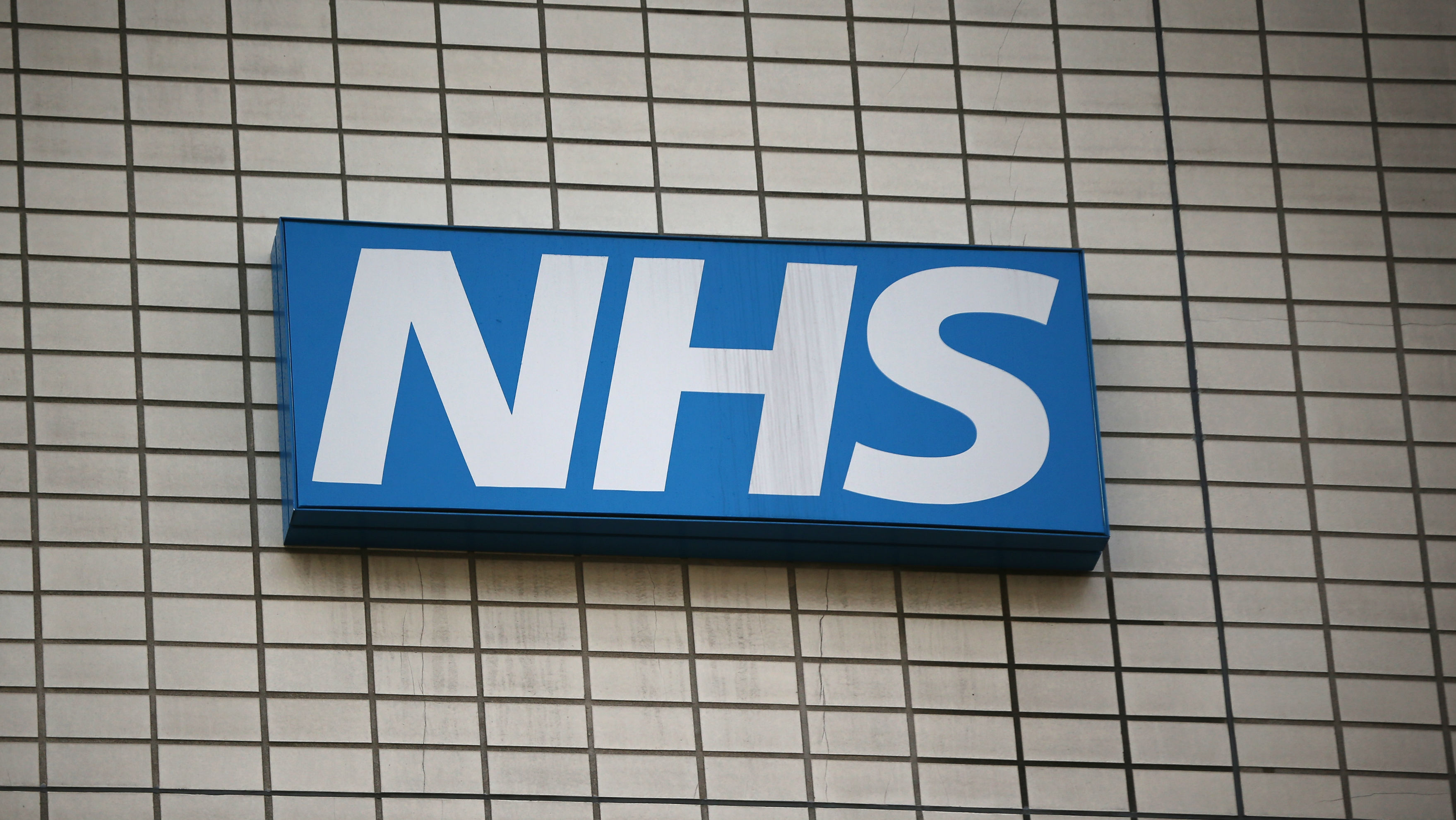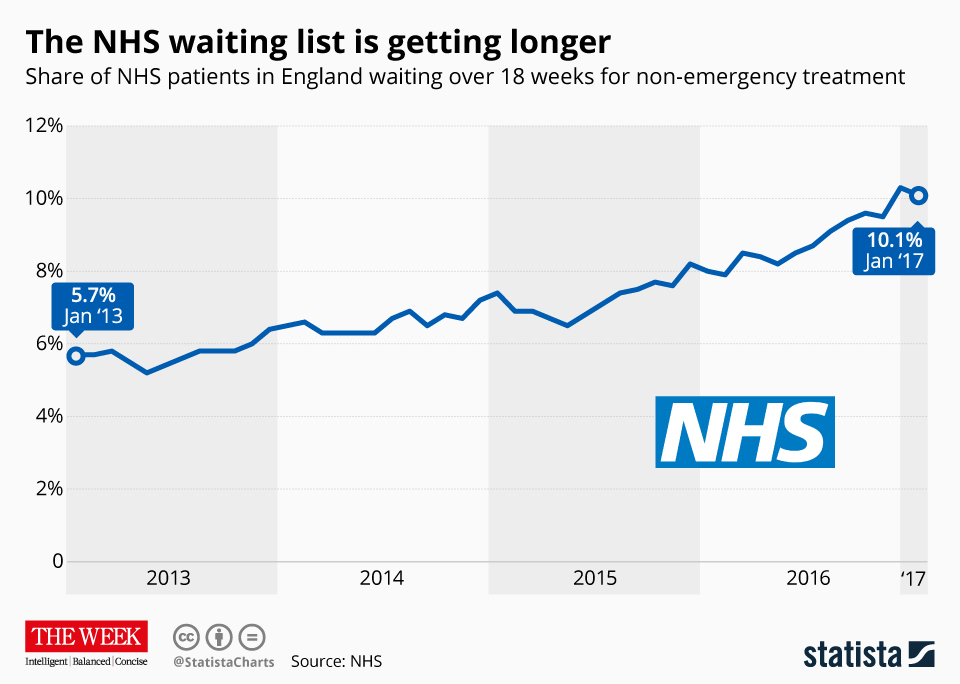NHS abandons 18-week waiting times in 'trade-off'
Patients must wait longer for non-urgent operations in exchange for improved care elsewhere, says chief executive

A free daily email with the biggest news stories of the day – and the best features from TheWeek.com
You are now subscribed
Your newsletter sign-up was successful
NHS patients in England will have to wait longer for non-urgent operations and go without some new drugs under new plans to be announced today.
GPs will also be asked to cut back on the number of patients they refer to hospital and to encourage options such as physiotherapy instead.
Announcing the moves, Simon Stevens, chief executive of NHS England, said funding issues meant the service could no longer guarantee treatment within the 18-week target time and that longer waits for the likes of hip and knee replacements were a "trade-off" for improved care in other areas, such as cancer diagnosis and A&E care, reports The Times.
The Week
Escape your echo chamber. Get the facts behind the news, plus analysis from multiple perspectives.

Sign up for The Week's Free Newsletters
From our morning news briefing to a weekly Good News Newsletter, get the best of The Week delivered directly to your inbox.
From our morning news briefing to a weekly Good News Newsletter, get the best of The Week delivered directly to your inbox.
He added that radical modernisation of how the NHS works is needed to ensure it survives as a service funded by general taxation that is free at the point of use.
According to The Guardian, "the number of patients not receiving treatment within 18 weeks of referral has gone up by 100,000 since January 2016".
The Royal College of Surgeons of England (RCSE) accused the NHS of "waving the white flag on the 18-week target", while shadow health secretary Jonathan Ashworth said the news was disappointing.
He added: "More and more rationing of treatments is taking place, this plan confirms that [the] government has broken its promise by failing to give the NHS the funding it needs."
A free daily email with the biggest news stories of the day – and the best features from TheWeek.com
Steven's strategy has been "billed by NHS England as 'taking stock' of where the service has got to since the five-year strategy was unveiled in 2014", says BBC health editor Hugh Pym.
One thing noticeably missing in its 75 pages, he adds, is a request for extra cash.
Stevens "got into a spat with Number 10 Downing Street earlier this year by suggesting the NHS had not got the money it asked for" and "has clearly decided not to risk further strife by holding out the begging bowl again".
Pym continues: "Ambitions seem more limited than before, demand is rising faster than expected and the message from Stevens is 'this is the best we can do with what we have got'."
Today's report comes two months after the worst figures ever in terms of A&E waiting times were published. Official statistics showed 85.1 per cent of patients were seen within four hours in January 2017, down from 86.2 per cent in December.

Infographic provided by Statista, for theweek.co.uk
-
 Why is the Trump administration talking about ‘Western civilization’?
Why is the Trump administration talking about ‘Western civilization’?Talking Points Rubio says Europe, US bonded by religion and ancestry
-
 Quentin Deranque: a student’s death energizes the French far right
Quentin Deranque: a student’s death energizes the French far rightIN THE SPOTLIGHT Reactions to the violent killing of an ultra-conservative activist offer a glimpse at the culture wars roiling France ahead of next year’s elections.
-
 Secured vs. unsecured loans: how do they differ and which is better?
Secured vs. unsecured loans: how do they differ and which is better?the explainer They are distinguished by the level of risk and the inclusion of collateral
-
 A real head scratcher: how scabies returned to the UK
A real head scratcher: how scabies returned to the UKThe Explainer The ‘Victorian-era’ condition is on the rise in the UK, and experts aren’t sure why
-
 How dangerous is the ‘K’ strain super-flu?
How dangerous is the ‘K’ strain super-flu?The Explainer Surge in cases of new variant H3N2 flu in UK and around the world
-
 The ‘menopause gold rush’
The ‘menopause gold rush’Under the Radar Women vulnerable to misinformation and marketing of ‘unregulated’ products
-
 How the care industry came to rely on migrant workers
How the care industry came to rely on migrant workersThe Explainer Government crackdown on recruiting workers abroad risks deepening care sector crisis, industry leaders warn
-
 Could medics' misgivings spell the end of the assisted dying bill?
Could medics' misgivings spell the end of the assisted dying bill?Today's Big Question The Royal College of Psychiatrists has identified 'serious concerns' with the landmark bill – and MPs are taking notice
-
 Washwood Heath: Birmingham's pioneering neighbourhood health service
Washwood Heath: Birmingham's pioneering neighbourhood health serviceIn the Spotlight NHS England chair says there is a 'really good argument this is the model for the future'
-
 The UK's first legal drug consumption room
The UK's first legal drug consumption roomThe Explainer 'Potentially transformative moment in UK drugs policy' as The Thistle opens in Glasgow
-
 How can the UK solve the adult social care crisis?
How can the UK solve the adult social care crisis?Today's Big Question New commission announced to turn our buckling care sector around: yet more delay or finally a way forward?